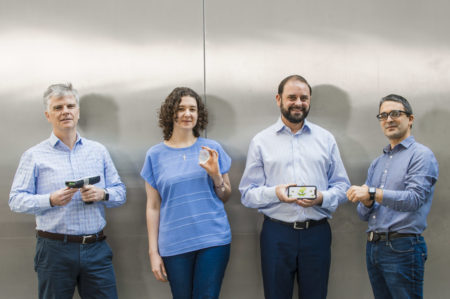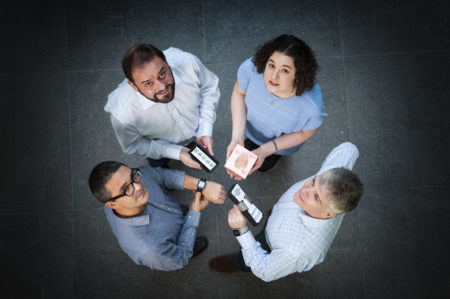18 December 2018
By Bryan Smyth
bryan@TheCork.ie
One of Europe’s leading technology research centres, Tyndall National Institute at University College Cork, will be involved in 4 key industry projects worth several million following the recent announcement of the Disruptive Technologies Innovation Funding. Tyndall teams, in collaboration with industry partners, will be driving disruptive innovation on the key areas of connected health, smart wearables, blockchain-based energy trading and photonics manufacturing.

Peter O’Brien (Photonics Manufacturing), Jacqueline Gunther (AURIGEN), Brian O’Regan (IERC) and Brendan O’Flynn (HOLISTICS) pictured at the announcement that Tyndall National Institute will be involved in 4 key industry projects worth Û8 million in Disruptive Technologies Innovation Funding. The DTIF Tyndall projects focus on key areas of photonics manufacturing, connected health, smart wearables and blockchain-based energy trading.
Pic Daragh Mc Sweeney/Provision

Brendan O’Flynn (HOLISTICS), Brian O’Regan (IERC), Jacqueline Gunther (AURIGEN) and Peter O’Brien (Photonics Manufacturing), pictured at the announcement that Tyndall National Institute will be involved in 4 key industry projects.
Pic Daragh Mc Sweeney/Provision
“As project lead in three major multi-million euro projects and partner on a fourth project, Tyndall’s track record for ground breaking innovations and disruptive technologies is clearly recognised. This funding also acknowledges our strong relationships and relevance for industry, with whom we are working closely on these disruptive projects,” said Tyndall CEO Prof. William Scanlon.
Acknowledging the funding secured by Tyndall, An Tánaiste Simon Coveney TD said, “The Disruptive Technologies Innovation funding, part of the Project Ireland 2040 Fund, is a key part of the Government’s Future Jobs initiative to secure Ireland’s economic success. We recognise the valuable role that Tyndall is playing in developing game changing technology that improves our lives and also ensures that Ireland is highly competitive and securing jobs for the future.”
The HOLISTICS project will create, for the first time in Ireland, a disruptive Smart Wearables Industry Value Chain to deliver end-to-end HealthTech solutions based on emerging human-centric intelligent sensors and their wireless communication of medically validated data sets to support new products and services in the areas of Health and Wellness. More than €7.4 million will be invested in the project, which is led by Tyndall and includes 9 industry partners as well as UCC Insight, HRB CRF-C and UCC Lero.
Also led by Tyndall, and with an investment of €4.1 Million, the Photonics Manufacturing Pilot Line project will establish an open-access, dedicated and sustainable pilot line addressing key technological and manufacturing challenges to the second digital revolution, where photonics and microelectronics will be integrated into miniaturised low-energy smart systems. The National Photonics Manufacturing Pilot Line will be built on a strong collaboration between world-class researchers, leading industrial equipment providers, manufacturing experts and product designers, all located in a single state-of-the-art facility to advance disruptive technologies from concept to commercialisation. The project will develop technologies that will reduce the cost of photonic packaging by 10-20 times, using highly innovative micro-optic technologies and ultra-fast fibre-optic packaging processes.
The International Energy Research Centre (IERC) at Tyndall was awarded €2.9 million for the Cooperative Energy Trading System (CENTS) project which enables both individual consumers and their broader communities generating their own electricity to provide a blockchain-based platform to trade electricity based on a cooperative model. This would significantly disrupt the Irish electricity market but could co-exist with the current market.
Partnered with industry, the AURIGEN project will see €5.9 million being invested in a solution for Persistent Atrial Fibrillation of the heart. Atrial fibrillation (AF) is the most common heart rhythm disturbance in the US and Europe, significantly affecting the lives of the afflicted, causing symptoms that range from palpitations to fatigue, weakness and activity intolerance, and substantially increasing the risks of stroke, congestive heart failure, dementia and death. The consortium of AuriGen Medical, the TMD lab and Tyndall have unique experience, expertise and proprietary technologies, which place this group in an unprecedented position to deliver a uniquely effective therapy capable of addressing both the stroke and arrhythmia risk associated with AF.

